-
ORIGINAL ARTICLE07-29-2024
Contribution of informal caregivers to self-care in individuals with heart failure
Revista Brasileira de Enfermagem. 2024;77(3):e20230492
Abstract
ORIGINAL ARTICLEContribution of informal caregivers to self-care in individuals with heart failure
Revista Brasileira de Enfermagem. 2024;77(3):e20230492
DOI 10.1590/0034-7167-2023-0492
Views0See moreABSTRACT
Objectives:
to evaluate the contribution of informal caregivers to the self-care of individuals with heart failure.
Methods:
a cross-sectional study was conducted with 87 caregivers from March to October 2022 in the city of João Pessoa/PB. The caregivers’ contribution was assessed using the Caregiver Contribution to Self-Care of Heart Failure Index instrument. Scores ≥ 70 points indicate adequate contribution. Data were analyzed using descriptive statistics and Spearman’s correlation.
Results:
the sample consisted of 81.6% female caregivers. Median scores obtained for the self-care contribution scales were: 63.3 for maintenance; 55.5 for management; and 66.6 for confidence. Caregivers never or rarely recommended monitoring body weight, regular physical exercise, extra use of diuretics, and fluid restriction.
Conclusions:
informal caregivers showed inadequate contribution in the areas of maintenance, management, and confidence in self-care of individuals with heart failure.
-
07-29-2024
Reflections on theoretical framework use in nursing research
Revista Brasileira de Enfermagem. 2024;77(3):e20230486
Abstract
Reflections on theoretical framework use in nursing research
Revista Brasileira de Enfermagem. 2024;77(3):e20230486
DOI 10.1590/0034-7167-2024-0486
Views0See moreABSTRACT
Objectives:
to reflect on theoretical framework use in nursing research.
Methods:
a theoretical-reflexive study, based on concepts and constructs pertinent to using nursing theories and other sciences, considering issues of epistemology or philosophy of science.
Results:
we presented what it is and why to do nursing research and what a theoretical framework is and why to use it, in addition to some considerations regarding theoretical framework use in nursing research, essential for constructing disciplinary knowledge, which enables the materialization of researchers’ work and the presentation of propositions resulting from investigations in and for nursing as a discipline and science.
Final Considerations:
based on a reflection based on epistemological conceptions, it is possible to affirm that a theoretical framework is the core of researchers’ thinking, delimiting a problem to be investigated and, based on it, outlining methodological strategies to be followed, supporting nursing action and thinking as discipline and science.

-
REVIEW07-29-2024
Nursing diagnoses for people hospitalized with heart failure: an integrative review
Revista Brasileira de Enfermagem. 2024;77(3):e20230471
Abstract
REVIEWNursing diagnoses for people hospitalized with heart failure: an integrative review
Revista Brasileira de Enfermagem. 2024;77(3):e20230471
DOI 10.1590/0034-7167-2023-0471
Views0See moreABSTRACT
Objectives:
to identify in the literature the main nursing diagnoses according to the NANDA-I diagnostic classification for people hospitalized with heart failure.
Methods:
an integrative literature review, carried out in February 2019 and updated in July 2023, in the MEDLINE via PubMed, LILACS, SciELO and CINAHL databases. Given the use of acronym PEO, studies without a time cut in Portuguese, English and Spanish were included. Descriptive analysis was carried out to present the identified information.
Results:
analysis of 27 articles identified 24 nursing diagnoses, with emphasis on Decreased Cardiac Output, Excessive Fluid Volume, Decreased Activity Tolerance and Fatigue.
Final Considerations:
evidence can contribute to better diagnostic decisions centered on people with heart failure in search of more assertive health results and have the potential to support future studies on a possible syndromic pattern in this population.

-
ORIGINAL ARTICLE07-29-2024
Primary Health Care in transitional care of people with stroke
Revista Brasileira de Enfermagem. 2024;77(3):e20230468
Abstract
ORIGINAL ARTICLEPrimary Health Care in transitional care of people with stroke
Revista Brasileira de Enfermagem. 2024;77(3):e20230468
DOI 10.1590/0034-7167-2024-0468
Views0See moreABSTRACT
Objectives:
to understand the role of Primary Health Care teams in caring for people with stroke after hospital discharge.
Methods:
single case study, with integrated units of analysis, with a qualitative approach. Data triangulation occurred through interviews with professionals and family caregivers involved in transition of care, in addition to direct observations in rounds and document analysis. For the analyses, the analytical strategies of theoretical propositions and construction of explanations were used, with the help of ATLAS.ti®.
Results:
the importance of counter-referral, the role of community health workers and the multidisciplinary team, health promotion, secondary prevention, home visits as a visceral attribute and nurses as care managers are evident.
Final Considerations:
the high demand on teams and the Social Determinants of Health interfere with adequate continuity of care. Transitional care programs that enable continuity of care are recommended.
-
ORIGINAL ARTICLE07-29-2024
Completeness of variables in Hospital-Based Cancer Registries for prostatic malignant neoplasm
Revista Brasileira de Enfermagem. 2024;77(3):e20230467
Abstract
ORIGINAL ARTICLECompleteness of variables in Hospital-Based Cancer Registries for prostatic malignant neoplasm
Revista Brasileira de Enfermagem. 2024;77(3):e20230467
DOI 10.1590/0034-7167-2023-0467
Views0See moreABSTRACT
Objectives:
to analyze the completeness of variables from Hospital-Based Cancer Registries of cases of prostate neoplasm in the Oncology Care Network of a Brazilian state between 2000 and 2020.
Methods:
an ecological time series study, based on secondary data on prostate cancer Hospital-Based Cancer Registries prostate. Data incompleteness was classified as excellent (<5%), good (between 5%-10%), fair (10%-20%), poor (20%-50%) and very poor (>50%), according to the percentage of lack of information.
Results:
there were 13,519 cases of prostate cancer in the Hospital-Based Cancer Registries analyzed. The variables “family history of cancer” (p<0.001), “alcoholism” (p<0.001), “smoking” (p<0.001), “TNM staging” (p<0.001) had a decreasing trend, while “clinical start of treatment” (p<0.001), “origin” (p=0.008) and “occupation” (p<0.001) indicated an increasing trend.
Conclusions:
most Hospital-Based Cancer Registries variables showed excellent completeness, but important variables had high percentages of incompleteness, such as TNM and clinical staging, in addition to alcoholism and smoking.
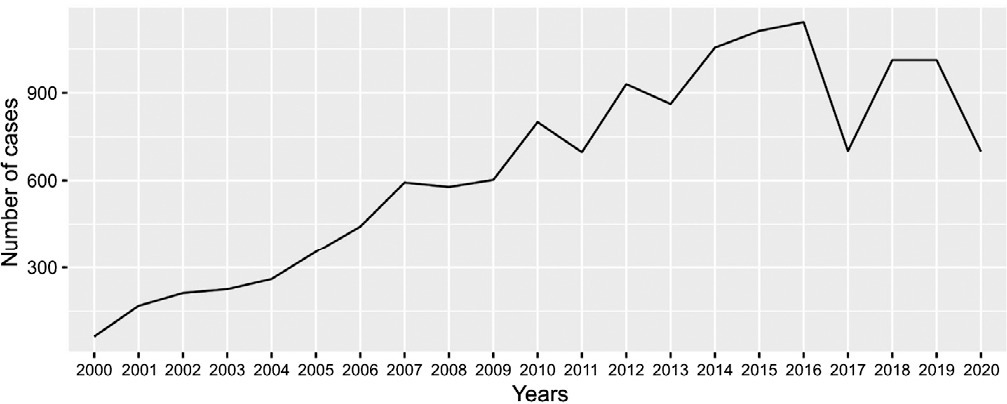
-
ORIGINAL ARTICLE07-29-2024
Disrupted mother-fetus dyad risk in high-risk pregnancies: a Middle-Range Theory
Revista Brasileira de Enfermagem. 2024;77(3):e20230464
Abstract
ORIGINAL ARTICLEDisrupted mother-fetus dyad risk in high-risk pregnancies: a Middle-Range Theory
Revista Brasileira de Enfermagem. 2024;77(3):e20230464
DOI 10.1590/0034-7167-2023-0464
Views0See moreABSTRACT
Objectives:
to develop and evaluate a Middle-Range Theory for the nursing diagnosis “Disrupted Mother-Fetus Dyad Risk” in high-risk pregnancies.
Methods:
this methodological study was conducted in two stages: theory development and evaluation. Dorothea Orem’s General Nursing Model was used as the theoretical-conceptual foundation. Evaluation was conducted using the Delphi method with seven judges, and consensus was achieved when the Content Validity Index of the evaluated items was ≥ 0.80.
Results:
the theory identified 20 elements of the nursing diagnosis “Disrupted Mother-Fetus Dyad Risk” (10 risk factors, 4 at-risk populations, and 6 associated conditions), 14 propositions, and 1 pictogram. After two rounds of evaluation, the theory was considered consistent, with consensus reached for all items, each achieving a Content Validity Index ≥ 0.80.
Conclusions:
the Middle-Range Theory included biopsychosocial factors explaining the nursing phenomenon “Disrupted Mother-Fetus Dyad Risk,” which aids in nurses’ diagnostic reasoning.
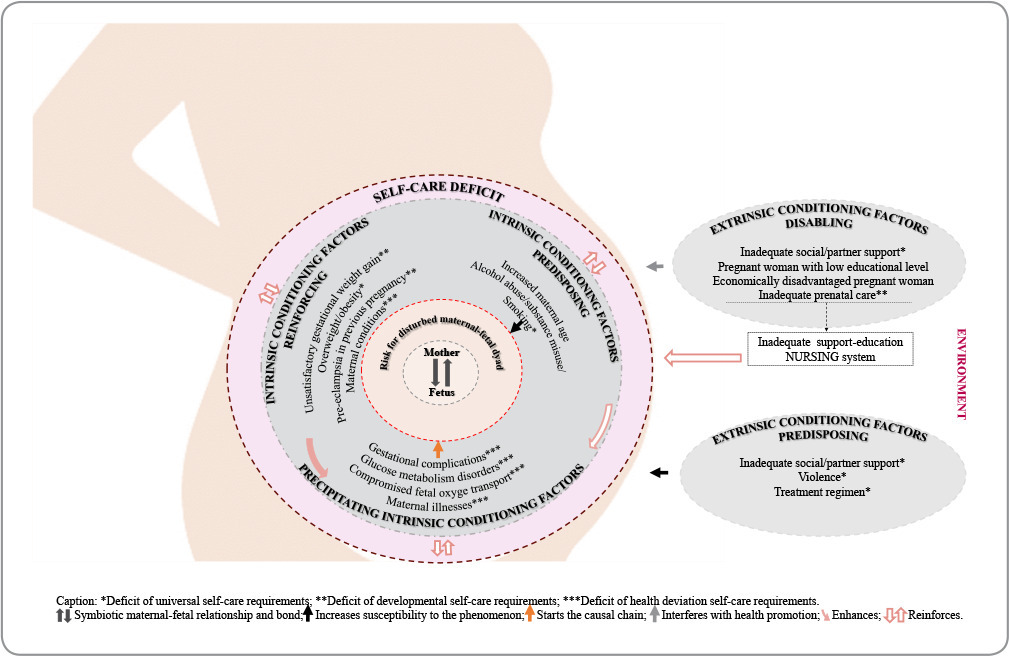
-
ORIGINAL ARTICLE07-29-2024
Mental health of parents of children and adolescents who require special health care
Revista Brasileira de Enfermagem. 2024;77(3):e20230457
Abstract
ORIGINAL ARTICLEMental health of parents of children and adolescents who require special health care
Revista Brasileira de Enfermagem. 2024;77(3):e20230457
DOI 10.1590/0034-7167-2023-0457
Views0See moreABSTRACT
Objective:
To identify the manifestations presented by parents of children and adolescents who require special health attention that can impact their mental health.
Methods:
exploratory, qualitative research, based on the concept of vulnerability, with data collection carried out through interviews with 18 parents of children and adolescents with special health care needs, hospitalized in the pediatric ward of a hospital in Paraná, between May/2017 and May/ 2018. Data analyzed by inductive thematic analysis.
Results:
parents experienced situations of vulnerability when providing care at home, with repercussions on their mental health, expressed by manifestations of lack of protection, anxiety and depression.
Final considerations:
It is important that health professionals seek to expand actions to promote care and reduce situations that generate threats, insecurities, concerns and damage to the health of parents, which can impact and further weaken care for children and adolescents who need attention especially health.
-
ORIGINAL ARTICLE07-29-2024
Evidence of validity of the Risk Self-Medication Questionnaire focused on Health Literacy
Revista Brasileira de Enfermagem. 2024;77(3):e20230386
Abstract
ORIGINAL ARTICLEEvidence of validity of the Risk Self-Medication Questionnaire focused on Health Literacy
Revista Brasileira de Enfermagem. 2024;77(3):e20230386
DOI 10.1590/0034-7167-2023-0386
Views0See moreABSTRACT
Objectives:
to analyze the validity evidence of the internal structure of the Risk Self-Medication Questionnaire Focused on Health Literacy.
Methods:
a psychometric study with 499 adults. The internal structure was assessed with exploratory and confirmatory factor analysis to prove the adjustment. Internal consistency was measured by composite reliability and McDonald’s omega coefficient (ω).
Results:
the parameters revealed a model of 35 items distributed across four factors, explaining 56% of the total variance, with factor loadings ranging from 0.31 to 0.85 and adequate communalities. Accuracy (0.79
Conclusions:
an instrument was obtained with good evidence of structural validity for measuring self-medication.
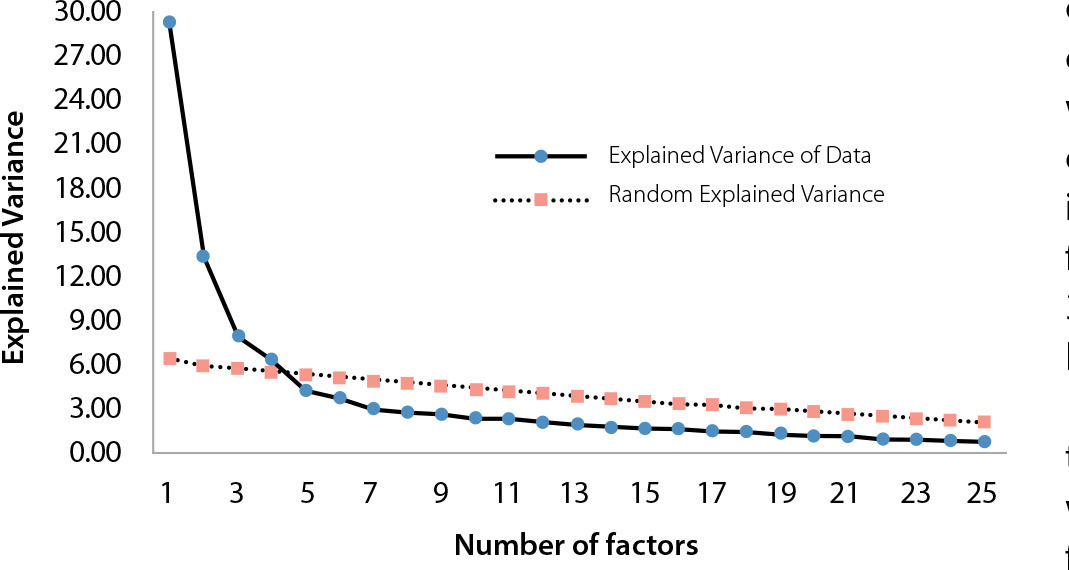
-
ORIGINAL ARTICLE05-18-2020
Militancy of nurses in the institutionality field: printed media versions
Revista Brasileira de Enfermagem. 2020;73(4):e20180835
Abstract
ORIGINAL ARTICLEMilitancy of nurses in the institutionality field: printed media versions
Revista Brasileira de Enfermagem. 2020;73(4):e20180835
DOI 10.1590/0034-7167-2018-0835
Views0See moreABSTRACT
Objectives:
to analyze nurses’ professional militancy in the institutionality field, presented by the printed media from Bahia State in the 1970s and 1980s.
Methods:
a historical and qualitative research under Social History’s perspective, whose data source was the newspaper A Tarde. The temporal cut-off encompasses milestones such as professional body restructuring and creation.
Results:
the Associação Brasileira de Enfermagem democratization movement was reported in a superficial way, highlighting the struggle for power spaces. With respect to Conselhos Federal e Regional de Enfermagem daBahia, the newspaper notified creation and function of bodies, however, there was no visibility to the newspaper’s performance. Concerning the union, there was political fragility of nurses against the creation and union participation in the fight for labor rights.
Final Considerations:
organization of political action occurred from isolated groups mobilization of professionals who were already traveling in political spaces, not the large mass of professionals.
-
ORIGINAL ARTICLE06-08-2020
Family experience living with advanced neoplasm: a glance at the rural population
Revista Brasileira de Enfermagem. 2020;73(4):e20180895
Abstract
ORIGINAL ARTICLEFamily experience living with advanced neoplasm: a glance at the rural population
Revista Brasileira de Enfermagem. 2020;73(4):e20180895
DOI 10.1590/0034-7167-2018-0895
Views1See moreABSTRACT
Objectives:
to understand the experience of rural families living with advanced cancer, from Family Management Style Framework’s perspective.
Methods:
a qualitative research conducted in seven cities of the northern of state of Rio Grande do Sul in homes of 11 families (27 people). Data collection took place in 2014, using the genogram and narrative interview. Analysis followed Family Management Style Framework’s theoretical model.
Results:
the results were organized into three categories based on conceptual components of the referred model: no more normal life: situation definition; attempt to reconcile care and work: management behavior; imminence of the finitude of life: perception of consequences.
Final Considerations:
living in rural context gives families specific ways of dealing with advanced cancer. Understanding the movements undertaken by rural families throughout the experience can guide nursing professionals in planning interventions collaborating with this population’s health.
-
ORIGINAL ARTICLE06-01-2020
Construction and validation of an educational technology for mother-child bond in the neonatal intensive care unit
Revista Brasileira de Enfermagem. 2020;73(4):e20190083
Abstract
ORIGINAL ARTICLEConstruction and validation of an educational technology for mother-child bond in the neonatal intensive care unit
Revista Brasileira de Enfermagem. 2020;73(4):e20190083
DOI 10.1590/0034-7167-2019-0083
Views0See moreABSTRACT
Objectives:
to describe the process of construction and validation of an educational booklet to promote bonding between mothers and newborns in a Neonatal Intensive Care Unit.
Methods:
methodological study developed through data collection in the literature and with the target audience; construction of the booklet; qualification of the material through validation by judges (health and communication experts/designer) and assessment by the target audience (mothers of at-risk newborns). Data were analyzed descriptively.
Results:
booklet content was validated, obtaining an overall Content Validity Index of 0.92. Appearance was rated “Superior” with 80% percentage. Mothers performed an assessment with 100% agreement between the items.
Conclusions:
the booklet was validated in all domains assessed and can be used by mothers with children hospitalized in the Neonatal Unit.

-
ORIGINAL ARTICLE06-08-2020
Risk factors for site complications of intravenous therapy in children and adolescents with cancer
Revista Brasileira de Enfermagem. 2020;73(4):e20190471
Abstract
ORIGINAL ARTICLERisk factors for site complications of intravenous therapy in children and adolescents with cancer
Revista Brasileira de Enfermagem. 2020;73(4):e20190471
DOI 10.1590/0034-7167-2019-0471
Views0See moreABSTRACT
Objectives:
to analyze predictive factors for the incidence of complications related to peripheral venous catheters in children and adolescents with cancer.
Methods:
a longitudinal follow-up study, conducted at a pediatric oncology clinic unit of a hospital in Bahia, with 333 peripheral venous catheters inserted in 77 children and 26 adolescents. Data collection took place between April 2015 and December 2016 through direct observation of peripheral intravenous catheter insertion, medical record data collection and daily observation of the puncture site.
Results:
the incidence of complications was 18.6%. The modeling of the variables confirmed that the risk factors for complications in children/adolescents with cancer were: prolonged peripheral intravenous therapy (p=0.002), history of complications (p=0.000), non-irritating/vesicant medications (p=0.003) and vesicant solutions (p=0.000).
Conclusions:
the goal has been achieved. Results can contribute to the theoretical, practical and social context.
-
ORIGINAL ARTICLE07-06-2020
Nurses’ work process in an emergency hospital service
Revista Brasileira de Enfermagem. 2020;73(5):e20180923
Abstract
ORIGINAL ARTICLENurses’ work process in an emergency hospital service
Revista Brasileira de Enfermagem. 2020;73(5):e20180923
DOI 10.1590/0034-7167-2018-0923
Views1See moreABSTRACT
Objectives:
to analyze the nurses’ work process in an Emergency Hospital Service.
Methods:
a qualitative, exploratory and descriptive research conducted with 17 nurses from the emergency service of a high complexity hospital in southern Brazil. Data were collected through interviews, focus group and document analysis. Data analysis followed the thematic content analysis framework.
Results:
four categories emerged: Work environment characteristics; Assistance dimension; Management dimension; Care management.
Final Considerations:
the nurses’ work process in Emergency Hospital Service is characterized by the peculiarities of the setting, with centrality in care and care management aiming at quality care and safety to patients.
-
REVIEW07-06-2020
Effectiveness of the automated drug dispensing system: systematic review and meta-analysis
Revista Brasileira de Enfermagem. 2020;73(5):e20180942
Abstract
REVIEWEffectiveness of the automated drug dispensing system: systematic review and meta-analysis
Revista Brasileira de Enfermagem. 2020;73(5):e20180942
DOI 10.1590/0034-7167-2018-0942
Views0See moreABSTRACT
Objectives:
to compare the effectiveness of the decentralized automated drug dispensing system with pockets.
Methods:
an effectiveness study based on a systematic review guided by the question: for patients admitted to hospital units, is the use of automated drug dispensing effective for reducing medication errors when compared to manual unit dose dispensing? The evidence was evaluated by the Grading of Recommendations Assessment, Development and Evaluation and the Preferred Reporting Items for Systematic Reviews and Meta-Analyses instrument, used in the report.
Results:
the sample was composed of 15 studies and none of them directly compared both technologies; however, the meta-analysis showed that there is no difference in effectiveness between them [OR 1.03 95%CI (0,12 – 8,99)].
Conclusions:
the conclusion is that the recommendation in favor of the automated dispensing system is weak.

-
ORIGINAL ARTICLE07-06-2020
Educational actions: an action research with Family Health Strategy professionals and users
Revista Brasileira de Enfermagem. 2020;73(5):e20180969
Abstract
ORIGINAL ARTICLEEducational actions: an action research with Family Health Strategy professionals and users
Revista Brasileira de Enfermagem. 2020;73(5):e20180969
DOI 10.1590/0034-7167-2018-0969
Views0See moreABSTRACT
Objectives:
to identify the factors that influence educational actions, and building with professionals and users proposed educational strategies that encourage popular participation.
Methods:
an action research, in which individual interviews, participant observation and Focus Group were conducted. Sixteen professionals and ten users from 2 Family Health Strategy from Rio Branco, Acre, Brazil participated. The results were organized by using the Thematic Analysis technique.
Results:
the thematic units emerged: Health education as a strategy that encourages changes in the lives of Family Health Strategyusers; Critical reflection on diagnosis of the causes that interfere in educational actions in the Family Health Strategy and proposition of new strategies; Potentialities that encourage the development of educational practices at Family Heath Units; Proposals for improving educational practices focused on soft health education technology in the dialogue dimension.
Conclusions:
the analysis showed a lack of community ties and traditional educational strategies. In the action phase, the actors agreed to participatory changes.
-
ORIGINAL ARTICLE07-01-2020
The systems and signs of political militants in/of Brazilian nursing
Revista Brasileira de Enfermagem. 2020;73(5):e20180971
Abstract
ORIGINAL ARTICLEThe systems and signs of political militants in/of Brazilian nursing
Revista Brasileira de Enfermagem. 2020;73(5):e20180971
DOI 10.1590/0034-7167-2018-0971
Views0See moreABSTRACT
Objectives:
to analyze the systems and signs in the constitution of militant nurses.
Methods:
a historical and qualitative research based on oral history carried out with 11 nurses who had been working in the professional field since 1980. Data collected from semi-structured interviews were organized into NVivo software 10, being analyzed through dialectical hermeneutics.
Results:
systems and signs are systems that allow us to use senses, symbols or meaning to objectify and subjectivate the subject. The revealed senses were categorized and divided into improper, religious, heroic, communist, and socially involved.
Conclusions:
militancy signs are convergent with what is put in national and international literature. The difference found was in the heroic sense and implicated with the social. Militant is almost never associated with positive aspects. An individual who builds himself as a political being empowers himself as a social being, making knowledge of power, generating a break in traditional models.
-
ORIGINAL ARTICLE02-03-2023
Quality of life and satisfaction of students with auriculotherapy in the covid-19 pandemic: a quasi-experimental study
Revista Brasileira de Enfermagem. 2023;76:e20220522
Abstract
ORIGINAL ARTICLEQuality of life and satisfaction of students with auriculotherapy in the covid-19 pandemic: a quasi-experimental study
Revista Brasileira de Enfermagem. 2023;76:e20220522
DOI 10.1590/0034-7167-2022-0522
Views0See moreABSTRACT
Objectives:
to evaluate the quality of life before and after the application of auriculotherapy and the satisfaction of university students with the treatment during the covid-19 pandemic.
Methods:
quasi-experimental study conducted with 44 students in a University Health Center. The intervention consisted of ten sessions of auriculotherapy focusing on emotional changes with quality of life assessment before and after treatment. The study also investigated the satisfaction concerning the intervention.
Results:
predominated among the students: women, from health courses, in use of psychotropic drugs and complaining of emotional changes. There was a statistically significant increase in all domains of quality of life, and students were satisfied with the treatment.
Conclusions:
auriculotherapy improved the quality of life of university students during the covid-19 pandemic, and the level of satisfaction with the treatment was high.
-
ORIGINAL ARTICLE08-16-2021
Management in clinical simulation: a proposal for best practices and process optimization
Revista Brasileira de Enfermagem. 2021;74:e20200515
Abstract
ORIGINAL ARTICLEManagement in clinical simulation: a proposal for best practices and process optimization
Revista Brasileira de Enfermagem. 2021;74:e20200515
DOI 10.1590/0034-7167-2020-0515
Views0See moreABSTRACT
Objectives:
to develop a best practices document with facilitating components and processes for simulation management.
Methods:
the methodological research was conducted between April and October 2017, using four approaches: observational research, conducted in an international simulation institution; Definition of theoretical framework, from the International Nursing Association for Clinical Simulation and Learning; integrative literature review, in international databases; and comparative analysis. It used Bardin’s analysis for the categorization of the information.
Results:
creation of a document with good practices in simulation regarding management and practice in simulation and management of resources and data, highlighting the use of technology and the training of professionals as the most important allies for overcoming the main limitations found.
Final Considerations:
the product of this study is a compilation of strategies for simulation management as a tool to enhance the application of the method with greater effectiveness.
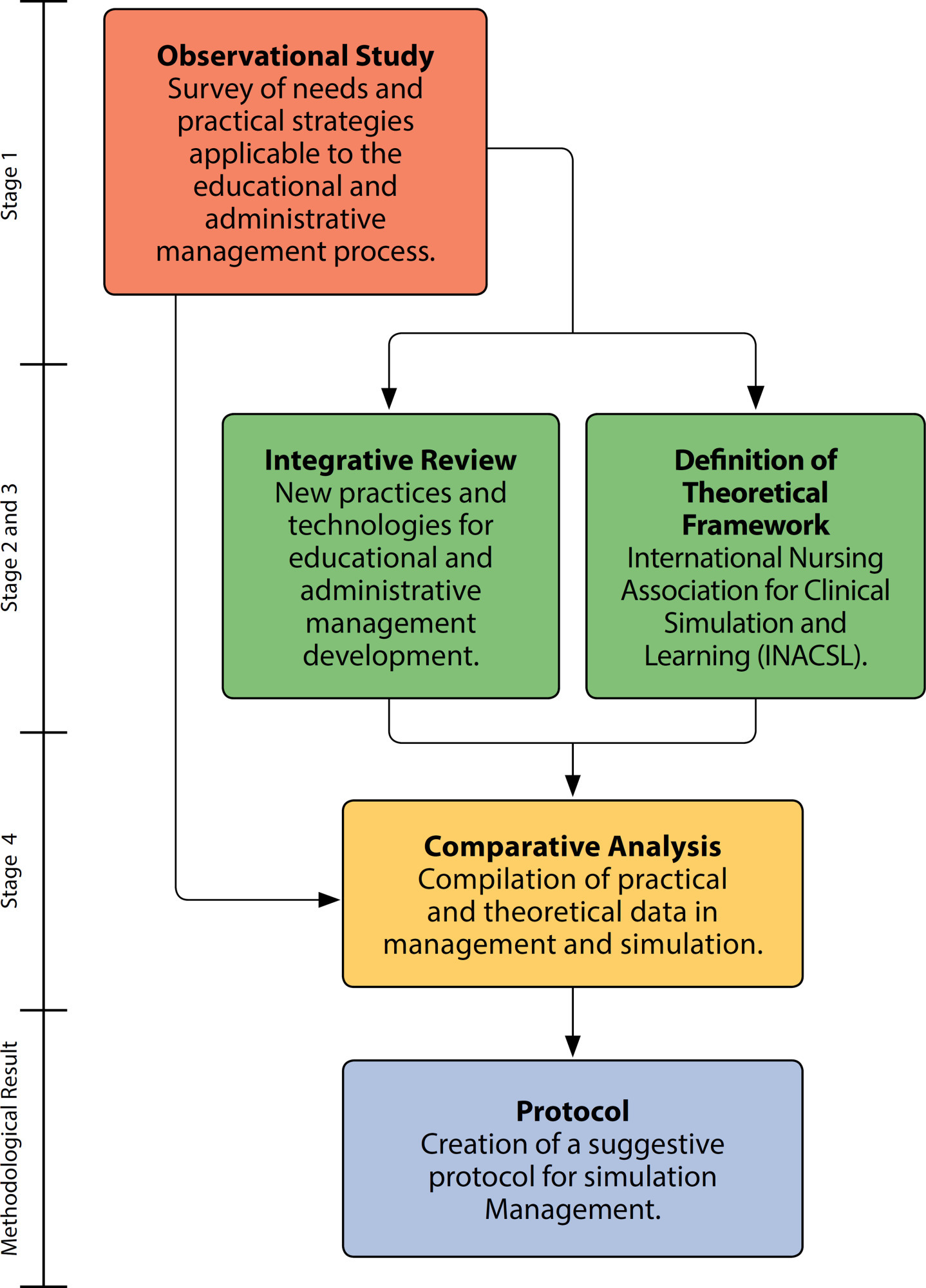
-
ORIGINAL ARTICLE08-19-2019
Health promotion by nursing technicians from the nurses’ perspective
Revista Brasileira de Enfermagem. 2019;72(4):979-987
Abstract
ORIGINAL ARTICLEHealth promotion by nursing technicians from the nurses’ perspective
Revista Brasileira de Enfermagem. 2019;72(4):979-987
DOI 10.1590/0034-7167-2018-0552
Views0See moreABSTRACT
Objective:
to analyze education and practice of nursing technicians in health promotion, from the perspective of teaching nurses of technical course and Primary Health Care nurses.
Method:
an exploratory study with qualitative data analysis, carried out in the city of São Paulo, through semi-structured interviews with nine public technical professors and 16 nurses from the basic health network. Data thematic analysis was carried out.
Results:
three thematic categories have emerged: Conceptions and experiences on health promotion; Nursing technician’s practice in health promotion; and Nursing technician education on health promotion.
Final considerations:
it is necessary to review the centrality given to technicalism in the education and practice of nursing technicians, contemplating the health promotion and seeking the development of professional competence for the construction of transformative practices aimed at valuing the autonomy and proactivity of the people in health and quality of life production.
-
REFLECTION02-15-2021
The belief in health in the adoption of COVID-19 prevention and control measures
Revista Brasileira de Enfermagem. 2021;74:e20200576
Abstract
REFLECTIONThe belief in health in the adoption of COVID-19 prevention and control measures
Revista Brasileira de Enfermagem. 2021;74:e20200576
DOI 10.1590/0034-7167-2020-0576
Views0See moreABSTRACT
Objective:
Reflect, in the light of the Health Belief Model, on the adoption of behavioral measures in the context of COVID-19.
Methods:
Theoretical-reflective essay, based on the Health Belief Model, to reflect on adherence to preventive behaviors in the pandemic of COVID-19.
Results:
Adherence to preventive behaviors is strongly influenced by socioeconomic, territorial, political and individual factors in the face of critical health situations. In addition, the spread of false news modulates the thinking and execution of behavioral actions in the population.
Final Considerations:
It is necessary to understand the importance of health communication processes and the use of tools aimed at responsible human behavior and engaged in the adoption of a preventive posture.
-
ORIGINAL ARTICLE04-07-2023
Suicide attempts by adolescents assisted in an emergency department: a cross-sectional study
Revista Brasileira de Enfermagem. 2023;76(2):e20220137
Abstract
ORIGINAL ARTICLESuicide attempts by adolescents assisted in an emergency department: a cross-sectional study
Revista Brasileira de Enfermagem. 2023;76(2):e20220137
DOI 10.1590/0034-7167-2022-0137
Views1See moreABSTRACT
Objectives:
to identify and characterize the care provided to adolescents admitted to an emergency department due to a suicide attempt.
Methods:
an observational, cross-sectional, descriptive study with a retrospective approach, carried out with medical records of adolescents aged 10 to 19 admitted for suicide attempts, between January 2015 and July 2020, in an emergency department. Data were subjected to descriptive and inferential analysis.
Results:
eighty-eight service occurrences were identified, mainly to females, exposed to multiple risk factors. Exogenous intoxication was the main method used, occurring at home and on weekdays. There were systemic repercussions, requiring multiple interventions and hospitalizations. Only 26% of cases were notified.
Conclusions:
adolescents treated for suicide attempts were exposed to multiple risk factors, with intoxication as the main means used. There is concern about the underreporting of cases and the logic of clinical care and medicalization.
-
ORIGINAL ARTICLE09-07-2020
Profile and entrepreneurial intention of nursing students: a comparison between Brazil and Chile
Revista Brasileira de Enfermagem. 2020;73(6):e20190890
Abstract
ORIGINAL ARTICLEProfile and entrepreneurial intention of nursing students: a comparison between Brazil and Chile
Revista Brasileira de Enfermagem. 2020;73(6):e20190890
DOI 10.1590/0034-7167-2019-0890
Views0See moreABSTRACT
Objective:
to identify and compare factors associated with profile, intentions, motivations, and barriers to entrepreneurial behavior of nursing students from Brazil and Chile.
Methods:
this cross-sectional study was carried out between March and September 2018 including 889 nursing students. A form was used to assess the socio-demographic profile, professional claims, entrepreneurial intentions and motivations. Statistical analysis used Chi-Square and Fisher’s Exact tests, with a 5% significance level, and a simple logistic regression model.
Results:
there are significant differences between countries in the profile of students and in the motivations studied, but not in professional pretensions and entrepreneurial intentions. Lack of education on the subject reveals itself as an important barrier to entrepreneurship.
Conclusion:
given the lack of teaching entrepreneurship in undergraduate nursing courses and the characteristics inherent to students, education must be appropriate to different cultures to prepare future professionals for other areas of practice.
-
REVIEW10-05-2020
Self-efficacy of health professionals in hand hygiene practice: is it possible to measure?
Revista Brasileira de Enfermagem. 2020;73:e20190873
Abstract
REVIEWSelf-efficacy of health professionals in hand hygiene practice: is it possible to measure?
Revista Brasileira de Enfermagem. 2020;73:e20190873
DOI 10.1590/0034-7167-2019-0873
Views0See moreABSTRACT
Objective:
To identify in the literature the tools used to measure self-efficacy of health professionals in hand hygiene.
Methods:
Integrative literature review carried out by consulting the databases PubMed, Scopus, Web of Science, Cumulative Index to Nursing and Allied Health Literature, Europe PubMed Central, and Science Direct using the descriptors Self Efficacy, Hand Hygiene, and Health Personnel.
Results:
Six articles, all of which with observational design, were selected. It was possible to infer that four studies used validated instruments to measure self-efficacy of health professionals in the conformity with the recommendations for hand hygiene. The other studies used questionnaires that were not validated.
Final considerations:
Despite the extensive literature on hand hygiene, there is a lack of scientific evidence regarding the use of validated instruments to measure self-efficacy of health professionals in the procedure. The use of properly validated psychometric instruments is useful to guarantee the quality of results in studies.

-
ORIGINAL ARTICLE05-24-2021
Content validation of an educational booklet for asthma control and management in children
Revista Brasileira de Enfermagem. 2021;74:e20200353
Abstract
ORIGINAL ARTICLEContent validation of an educational booklet for asthma control and management in children
Revista Brasileira de Enfermagem. 2021;74:e20200353
DOI 10.1590/0034-7167-2020-0353
Views0See moreABSTRACT
Objective:
to validate the content and appearance of the educational booklet “You can control your child’s asthma – let’s learn together?” with parents and caregivers of children with asthma.
Methods:
this is a methodological study, carried out with 34 mothers and caregivers of children, from two to 10 years old, diagnosed with asthma. The educational booklet validation was performed using Content Validity Index (CVI) and assessment of comprehension, attractiveness, self-efficacy, persuasion, and cultural acceptance domains.
Results:
the booklet was considered clear (99.8%) and relevant (100%), with a global CVI of 0.99. Domain assessment proved to be an easy-to-understand tool, culturally appropriate, attractive, with persuasive power and promoting self-efficacy.
Conclusion:
the booklet is valid and adequate for promoting the self-efficacy of parents and caregivers in childhood asthma control and management, potentially scalable to other realities of outpatient care.
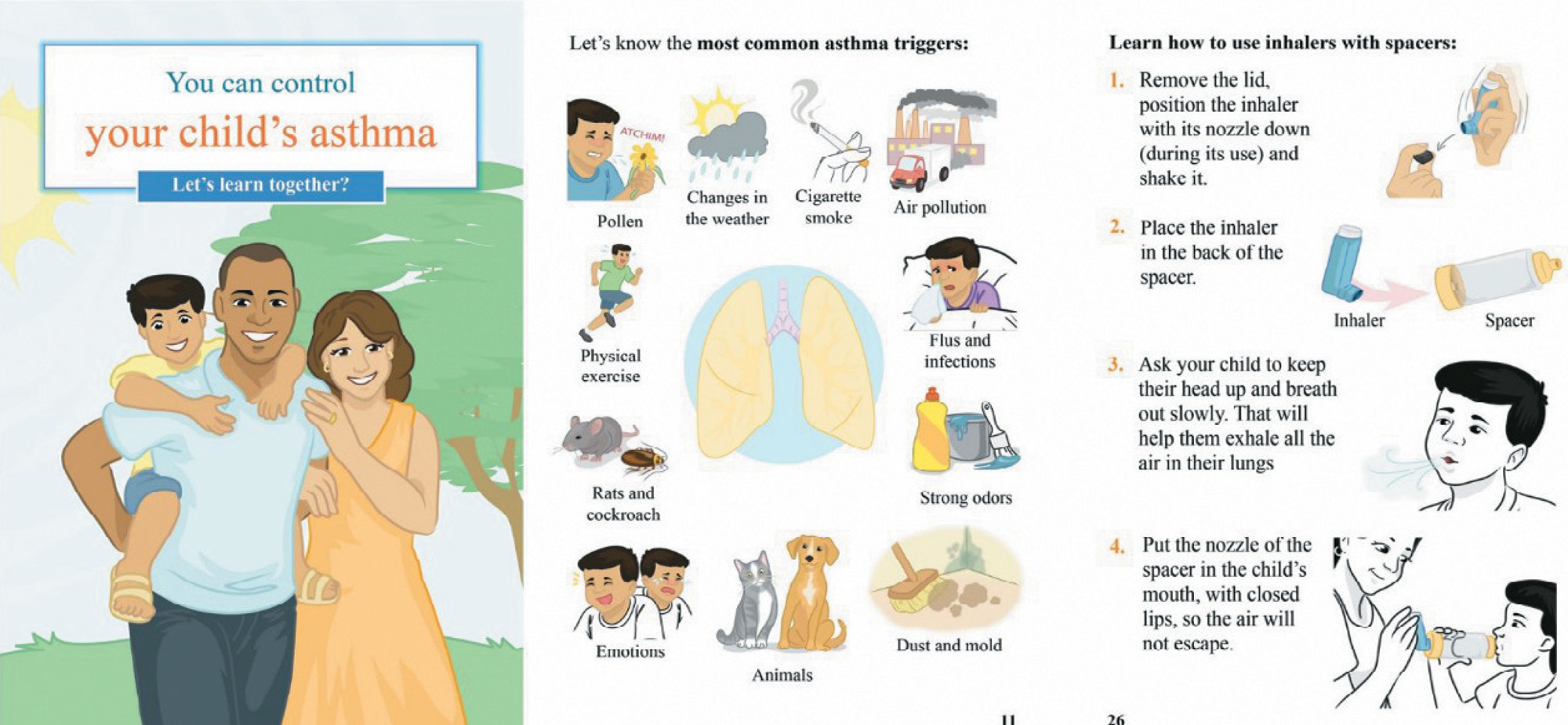
Search
Search in:
Nuvem de Tags
Adolescente (85) Atenção Primária à Saúde (239) COVID-19 (91) Criança (91) Cuidados de Enfermagem (269) Educação em Enfermagem (151) Educação em Saúde (139) Enfermagem (930) Enfermagem Pediátrica (86) Estudantes de Enfermagem (77) Estudos de Validação (131) Família (87) Idoso (208) Promoção da Saúde (99) Qualidade de Vida (104) Saúde do Trabalhador (86) Saúde Mental (145) Saúde Pública (82) Segurança do Paciente (150) Tecnologia Educacional (100)



